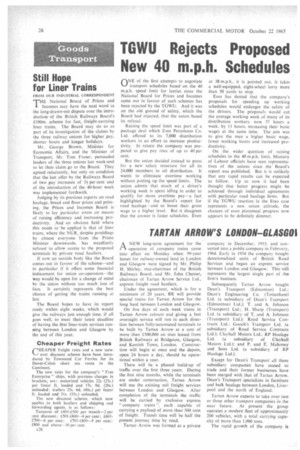TGWU Rejects Proposed New 40 m.p.h. Schedules
Page 28

If you've noticed an error in this article please click here to report it so we can fix it.
ONE of the first attempts to negotiate transport schedules based on the 40 m.p.h. speed limit for lorries since the National Board for Prices and Incomes came out irt favour of such schemes has been rejected by the TGWU. And it was on the old ground of safety, which the Board had rejected, that the union based its refusal.
Raising the speed limit was part of a package deal which Esso Petroleum Co. Ltd. offered to its 7,000 distribution workers in an effort to increase productivity. In return the company was prepared to give pay rises of up to 40 per Cent.
But the union decided instead to press for a new salary structure for all its 24,000 members in oil distribution. It wants to eliminate overtime working without putting up the speed limits. The union admits that much of a driver's working week is spent idling in order to qualify for more overtime pay—a fact highlighted by the Board's report for road haulage —and so boost their gross wage to a higher level. But it disagrees that the answer is faster schedules. Even at 38 m.p.h.. it is pointed out, it takes a well-equipped, eight-wheel lorry more than 50 yards to stop.
Esso has denied that the company's proposals for speeding up working schedules would endanger the safety of the drivers. The proposals would cut the average working week of many of its distribution workers. now 57 hours a week, by 13 hours, increasing their basic wages at the same tittle. The aim was to give the men a higher basic wage, fewer working hours and increased productivity.
On the wider question of raising• schedules to the 40 m.p.h. limit, Ministry of Labour officials have seen representatives of the unions since the Board's report was published. But it is unlikely that any rapid results can be expected to follow. Up to now it had been thought that better progress might be achieved through individual agreements with particular road haulage firms. But if the TGWU reaction in the Esso case represents a new union attitude, the chances of even piecemeal progress now appears to be definitely dimmer.
















































































































